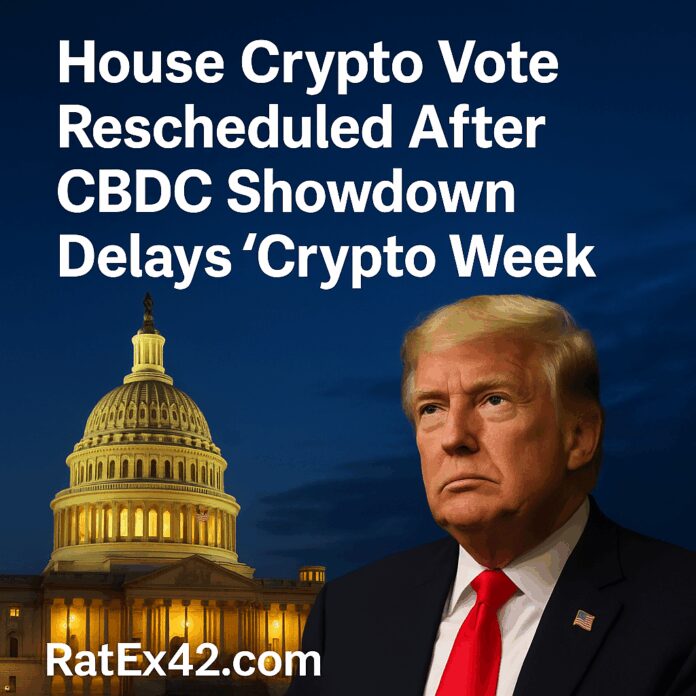A procedural revolt, a Trump-led late-night deal, and three digital asset bills that could reshape U.S. crypto regulation—here’s what RatEx42 traders need to know.
Surprise disruption on Day 1
What was supposed to be a celebratory launch of “Crypto Week” in the U.S. House turned chaotic on Tuesday, July 15, when a procedural vote—known as the rule—failed 196–223 after 13 Republicans broke ranks and joined Democrats in voting no.
The reason: a standoff over how—and whether—to ban a central bank digital currency (CBDC) in the U.S.
👉 Cointelegraph: House Crypto Vote Postponed After CBDC Dispute
👉 Axios: GOP Revolt Delays Crypto Legislation
👉 AP News: Trump Meets with House Rebels on CBDC Ban
Trump to the rescue: Late-night Oval Office deal
Within hours, former President Donald Trump announced he had hosted a meeting with “11 of the 12” Republican rebels in the Oval Office and secured their support for a revote scheduled Wednesday morning (July 16).
Speaker Mike Johnson reportedly joined the discussion by phone and committed to bringing the vote back “as early as possible.”
The three key crypto bills in play
| Bill | Purpose | Key Flashpoint |
|---|---|---|
| GENIUS Act | Sets federal licensing and disclosure rules for payment stablecoin issuers, including 1:1 reserves, audits, and transparency requirements. | Critics fear it may leave loopholes for a future layered CBDC or public–private wallet model. |
| Anti-CBDC Surveillance State Act (H.R. 1919) | Bans the Federal Reserve from piloting, issuing, or testing a retail digital dollar. | Democrats warn this could hinder U.S. competitiveness in future payments innovation. |
| Digital Asset Market CLARITY Act (H.R. 3633) | Allocates crypto market oversight: CFTC for commodities, SEC for securities; defines “decentralization” thresholds. | Widely supported, though DeFi stakeholders seek Senate amendments. |
👉 Reuters: Senate Passes Stablecoin Bill Ahead of House Vote
👉 House Financial Services Committee: Crypto Week Agenda
👉 Anti-CBDC Bill Summary (PDF)
Market jitters but no meltdown
After the failed vote, Bitcoin dipped by about 3%, while Coinbase and Circle stocks dropped between 2–5% before partially recovering on news of a Trump-brokered deal.
Markets appear to be treating the delay as procedural—not structural—for now.
CBDC debate: What’s really at stake?
Hardline Republicans like Rep. Marjorie Taylor Greene argue that a retail CBDC would enable “programmable money” controlled by the federal government—essentially a surveillance tool.
Supporters of the GENIUS Act counter that the bill already prohibits Fed wallets and direct consumer access, making an explicit ban redundant. They argue that an overly broad CBDC prohibition could prevent future U.S. leadership in payments tech.
👉 ABC News: What the Anti-CBDC Bill Actually Says
👉 Trump Executive Order on CBDCs (January 2025)
What’s next: Timeline from here
- Wednesday, July 16: House will attempt the rule vote again. If it passes, floor debate on the GENIUS Act can begin immediately.
- Later this week: House votes on the CLARITY Act and the Anti-CBDC Act, unless leaders decide to bundle all three.
- Before August recess: GOP leadership wants all three bills passed before lawmakers leave town on August 2.
Failure to revive the rule would delay “Crypto Week” until at least September, creating regulatory limbo through summer.
What it means for RatEx42 users
✅ 1. Stablecoin clarity = narrower spreads
If the GENIUS Act becomes law, fully reserved, licensed stablecoins like USDC and PayPal USD would gain regulatory clarity, potentially tightening spreads and improving liquidity on RatEx42 trading books.
✅ 2. Token classification = compliance roadmap
The CLARITY Act would define when tokens qualify as commodities (CFTC) versus securities (SEC). For RatEx42, that means less ambiguity—but also stricter compliance for tokens that fail the decentralization test.
✅ 3. CBDC ban = no retail FedCoin risk
If the Anti-CBDC Act passes, the Fed would be barred from launching a digital dollar without explicit new legislation. Private stablecoins would maintain dominance, at least for this decade.
⚠️ 4. More delays = more volatility
Another failed vote could spark renewed market volatility. Expect increased movement across BTC, ETH, and stablecoins as headlines drive sentiment and regulators remain sidelined.
Bottom line:
This week’s votes may mark the most consequential crypto legislation moment since 2019. Whether the House acts—or stalls—will shape everything from wallet policy and stablecoin infrastructure to token listings and SEC enforcement.
Stay tuned to RatEx42.com for real-time updates as this fast-moving situation unfolds.




